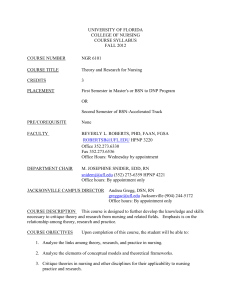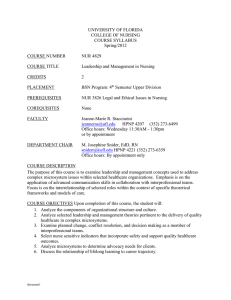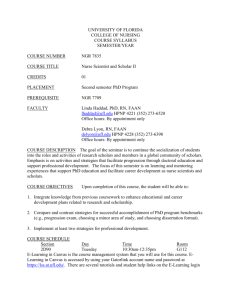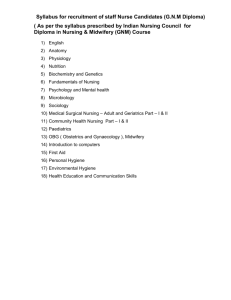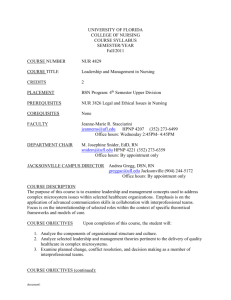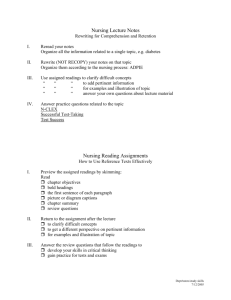UNIVERSITY OF FLORIDA
advertisement
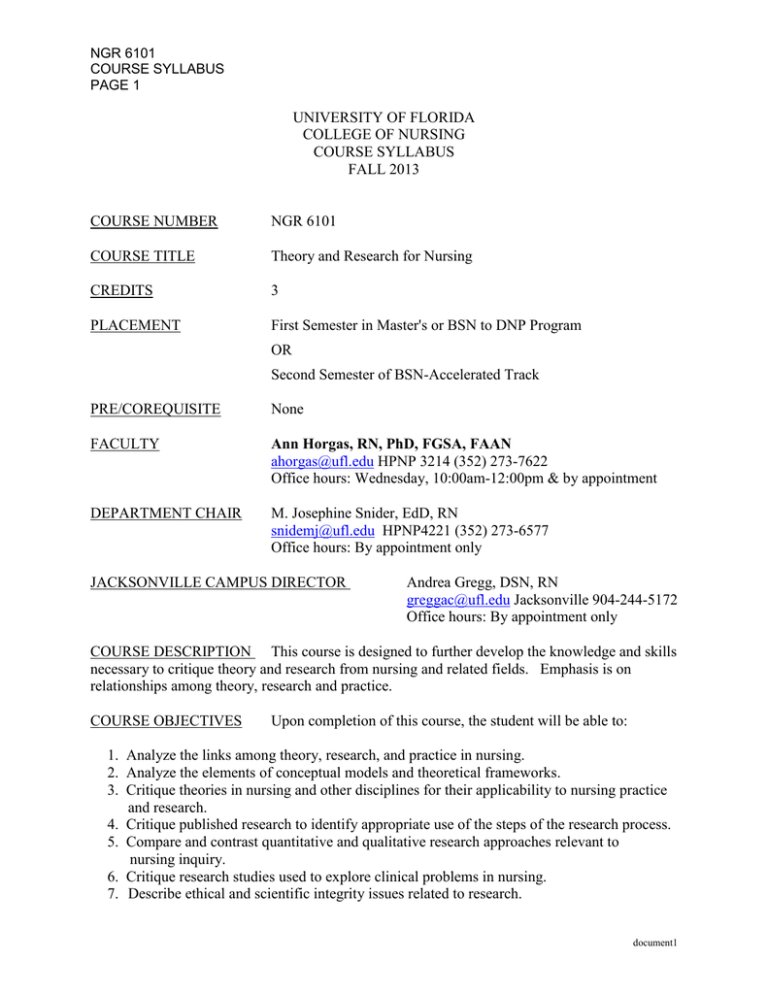
NGR 6101 COURSE SYLLABUS PAGE 1 UNIVERSITY OF FLORIDA COLLEGE OF NURSING COURSE SYLLABUS FALL 2013 COURSE NUMBER NGR 6101 COURSE TITLE Theory and Research for Nursing CREDITS 3 PLACEMENT First Semester in Master's or BSN to DNP Program OR Second Semester of BSN-Accelerated Track PRE/COREQUISITE None FACULTY Ann Horgas, RN, PhD, FGSA, FAAN ahorgas@ufl.edu HPNP 3214 (352) 273-7622 Office hours: Wednesday, 10:00am-12:00pm & by appointment DEPARTMENT CHAIR M. Josephine Snider, EdD, RN snidemj@ufl.edu HPNP4221 (352) 273-6577 Office hours: By appointment only JACKSONVILLE CAMPUS DIRECTOR Andrea Gregg, DSN, RN greggac@ufl.edu Jacksonville 904-244-5172 Office hours: By appointment only COURSE DESCRIPTION This course is designed to further develop the knowledge and skills necessary to critique theory and research from nursing and related fields. Emphasis is on relationships among theory, research and practice. COURSE OBJECTIVES Upon completion of this course, the student will be able to: 1. Analyze the links among theory, research, and practice in nursing. 2. Analyze the elements of conceptual models and theoretical frameworks. 3. Critique theories in nursing and other disciplines for their applicability to nursing practice and research. 4. Critique published research to identify appropriate use of the steps of the research process. 5. Compare and contrast quantitative and qualitative research approaches relevant to nursing inquiry. 6. Critique research studies used to explore clinical problems in nursing. 7. Describe ethical and scientific integrity issues related to research. document1 NGR 6101 COURSE SYLLABUS PAGE 2 COURSE SCHEDULE Section Day 8595 Web Time Room This course is a web-based course that requires a computer to access and use online resources and to interact with the course content, other students, and the faculty member. Sakai is the course management system that you will use for this course. To access Sakai, you will go to the E-learning site at http://lss.at.ufl.edu and sign into Sakai using your Gatorlink account name and password. There are several tutorials and student help links on the E-Learning login site. If you have technical questions or problems, call the UF Computer Help Desk at 352-392-HELP or send email to helpdesk@ufl.edu. Voicethread will also be used in this course. A VoiceThread is a collaborative, multimedia slide show that holds images, documents, and videos and allows people to navigate pages and leave comments using voice (with a microphone or telephone), or video (via a webcam). You do not need to provide a photo or use the video comment option; this is your choice. If you do not want to be recorded, notify the assigned faculty member prior to the first class for alternative. The recordings are available to the class during the semester and will not be used for another class. The recordings are deleted at the end of the course. The link to VoiceThread is found on the opening screen of Sakai. The initial link to access and log onto Voicethread will be sent to your Gatorlink e-mail. For the purposes of this class, except for week 1, the week will begin on Monday morning at 8:30 AM and will close on Sunday evening at 11:59 PM. Week 1 will begin 8:30 AM 8/21/13 and end 8/25/12 at 11:59 PM. It is important that you regularly check your Gatorlink account email for College and University wide information and the course E-Learning (Sakai) site for announcements and notifications. All feedback will be given on the web via E-Leaning (Sakai) and occasional direct emails, including grades and comments on assignments. ATTENDANCE Students are expected to participate online in all teaching modules, activities, discussions and quizzes. These are listed in the course syllabus, teaching modules and the course web-site. Students who have extraordinary circumstances preventing participation should explain these to the course instructor as soon as possible prior to the scheduled activity. Instructors will make an effort to accommodate reasonable requests. A grade penalty of 1 point per day will be assigned for late assignments, including quizzes and tests, unless prior approval is obtained. Make-up quizzes may not be available. ACCOMMODATIONS DUE TO DISABILITY Each semester, students are responsible for requesting a memorandum from the Disability Resource Center (http://www.dso.ufl.edu/index.php/drc/) to notify faculty of their requested individual accommodations. This should be done at the start of the semester. document1 NGR 6101 COURSE SYLLABUS PAGE 3 COUNSELING AND MENTAL HEALTH SERVICES Students may occasionally have personal issues that arise on the course of pursuing higher education or that may interfere with their academic performance. If you find yourself facing problems affecting your coursework, you are encouraged to talk with an instructor and to seek confidential assistance at the University of Florida Counseling and Wellness Center, 352-3921575, visit their web site for more information: http://www.counseling.ufl.edu/cwc/. STUDENT HANDBOOK Students are to refer to the College of Nursing Student Handbook for information about College of Nursing policies, honor code, and professional behavior. http://nursing.ufl.edu/students/student-policies-and-handbooks/ ACADEMIC HONESTY The University of Florida Student Conduct and Honor Code may be found at http://www.dso.ufl.edu/index.php/sccr/process/student-conduct-honor-code/ TOPICAL OUTLINE 1. Theories from nursing and other disciplines influencing evidenced-based practice including general systems theory 2. Critique/evaluation of theories, models, and frameworks 3. Analysis of the relationship between theory, research, and practice 4. Selected steps of the research process: 5. Problems and purpose 6. Review of relevant literature 7. Objectives, hypotheses and questions 8. Research design 9. Qualitative research approaches 10. Quantitative research approaches 11. Ethical issues in research 12. Scientific integrity TEACHING METHODS Asynchronous interactive e-Learning modules using Sakai and VoiceThread. LEARNING ACTIVITIES Discussion, small group activities, quizzes, presentations and written assignments, EVALUATION METHODS/COURSE GRADE CALCULATION Each student is expected to (1) comprehensively read and critically analyze materials assigned for each class topic, (2) actively participate in weekly online discussions and activities of class topics, and (3) successfully complete all assignments. Evaluation will be based on the achievement of these criteria. Assignments and their relative weights are as listed below. Details of each assignment will be posted on Sakai. ALL assignments are due on the date assigned by 11:59 PM Sunday evening. If lateness is document1 NGR 6101 COURSE SYLLABUS PAGE 4 unavoidable, notify the professor prior to the scheduled time. Unexcused late submission will result in grade reduction of 1 point per day. Feedback on assignments/papers will be returned within 2 weeks of due date. Assignment On-line participation and completion of class activities Written Paper Quizzes (3) NIH Human Subjects Training Group Presentation GRADING SCALE/QUALITY POINTS A 95-100 (4.0) C A93-94 (3.67) CB+ 91- 92 (3.33) D+ B 84-90 (3.0) D B82-83 (2.67) DC+ 80-81 (2.33) E * 74 is the minimal passing grade % of Final Grade 20% 25% 20% 10% 25% 100% 74-79* (2.0) 72-73 (1.67) 70-71 (1.33) 64-69 (1.0) 62-63 (0.67) 61 or below (0.0) For more information on grades and grading policies, please refer to University’s grading policies at http://www.registrar.ufl.edu/catalog/policies/regulationgrades.html FACULTY EVALUATION Students are expected to provide feedback on the quality of instruction in this course based on ten criteria. These evaluations are conducted online at https://evaluations.ufl.edu. Evaluations are typically open during the last two or three weeks of the semester, but students will be given specific times when they are open. Summary results of these assessments are available to students at https://evaluations.ufl.edu. REQUIRED TEXTS American Psychological Association (2010). Publication manual of the American Psychological Association (6th ed.). Washington, DC: Author. Polit, D. F., & Beck, C. (2010). Nursing research: Generating and assessing evidence for nursing practice (9th ed). Philadelphia: Lippincott. Assigned articles (links posted on e-learning) document1 NGR 6101 COURSE SYLLABUS PAGE 5 WEEKLY CLASS SCHEDULE Wk. 1 Date Aug. 21 – Aug. 25 Topic INTRODUCTIONS: COURSE OVERVIEW FOUNDATIONS OF NURSING: RESEARCH AND EVIDENCEBASED PRACTICE Readings: P&B: Chapter 1: Introduction to Nursing Research in an EvidenceBased Practice Environment 2 Aug. 26 – Sept. 1 RESEARCH, THEORY, AND CLINICAL PRACTICE Readings: P&B: Chapter 2: Evidence-based Nursing: Translating Research Evidence into Practice 3 Sept. 2 – Sept. 8 GETTING ORGANIZED; FINDING RESOURCES; REVIEWING LITERATURE Sept. 2 = Labor Day Holiday Readings: P&B: Chapter 3: Key Concepts and Steps in Qualitative and Quantitative Research P&B: Chapter 5: Literature Reviews: Finding and Critiquing Evidence Assignments: QUIZ #1 4 Sept. 9 – Sept. 15 UNDERSTANDING THEORY AND CONCEPTUAL MODELS Readings: Horgas, A. L., Yoon, S. L., Nichols, A. L., & Marsiske, M. (2008). The relationship between pain and functional disability in black and white older adults. Research in Nursing and Health, 31 (4), 341-54. (linked in Ares Course Reserve website) P&B: Chapter 6:Theoretical Frameworks 5 Sept. 16 – Sept. 22 USING THEORY AND CONCEPTUAL MODELS Readings: Fawcett, Chapter 2: Implementing Conceptual-Theoretical-Empirical Systems of Nursing Knowledge in Practice (see link on class link in Ares Course Reserve website) ADDITIONAL READINGS AS ASSIGNED Assignments: QUIZ #2 document1 NGR 6101 COURSE SYLLABUS PAGE 6 6 Sept. 23 – Sept. 29 QUANTITIVE RESEARCH: CONCEPTUALIZING A STUDY TO GENERATE EVIDENCE FOR NURSING Readings: P&B: Chapter 4: Research Problems, Research Questions, and Hypotheses P&B: Chapter 8: Planning a Nursing Study Stone, P. W. (2002). Popping the (PICO) question in research and evidence-based practice. [doi: DOI: 10.1053/apnr.2002.34181]. Applied Nursing Research, 15(3), 197-198. (linked in Ares Course Reserve website) 7 Sept. 30 – Oct. 6 QUANTITIVE RESEARCH PROCESS: DESIGNS Readings: P&B: Chapter 9: Quantitative Research Design P&B: Chapter 10: Rigor and Validity in Quantitative Research P &B: Chapter 11: Specific Types of Quantitative Research Assignments: PAPER DUE ADDITIONAL READINGS AS ASSIGNED 8 Oct. 7 – Oct. 13 QUANTITIVE RESEARCH PROCESS: SAMPLE AND SETTING Readings: P&B: Chapter 12: Sampling in Quantitative Research ADDITIONAL READINGS AS ASSIGNED 9 Oct. 14 – Oct. 20 QUANTITIVE RESEARCH PROCESS: METHODS & MEASURES FOR ENHANCING SCIENTIFIC RIGOR Readings: P&B: Chapter 13: Data Collection in Quantitative Research P&B: Chapter 14: Measurement and Data Quality P&B: Chapter 15: Developing and Testing Self-report Scales document1 NGR 6101 COURSE SYLLABUS PAGE 7 10 Oct. 21 – Oct. 27 QUALITATIVE RESEARCH PROCESS: METHODS FOR QUALITATIVE RESEARCH Readings: P&B: Chapter 20: Qualitative Research Design and Approaches P&B: Chapter 21: Sampling in Qualitative Research P&B: Chapter 22: Data Collection in Qualitative Research ADDITIONAL READINGS AS ASSIGNED. Assignments: QUIZ #3 11 Oct. 28 – Nov. 3 ON-LINE CLASS PRESENTATIONS 12 Nov. 4 – Nov. 10 ON-LINE CLASS PRESENTATIONS 13 Nov. 11 – Nov. 17 ON-LINE CLASS PRESENTATIONS 14 Nov. 18 – Nov. 24 RESEARCH ETHICS http://phrp.nihtraining.com/users/login.php PRINT CERTIFICATE AND TURN IN BY 11/24 [SUBMIT VIA SAKAI] Readings: P&B: Chapter 7: Ethics in Nursing Research 15 Nov. 25 – Dec. 1 ON-LINE CLASS PRESENTATIONS Nov. 27-29 = Thanksgiving Break * Supplemental readings will be required ; information and links will be provided via e-learning. Approved: Academic Affairs Committee: 5/96; 5/01, 01/05 Faculty: 8/96; 6/01, 1/05 UF Curriculum: 10/96; 5/99 document1
